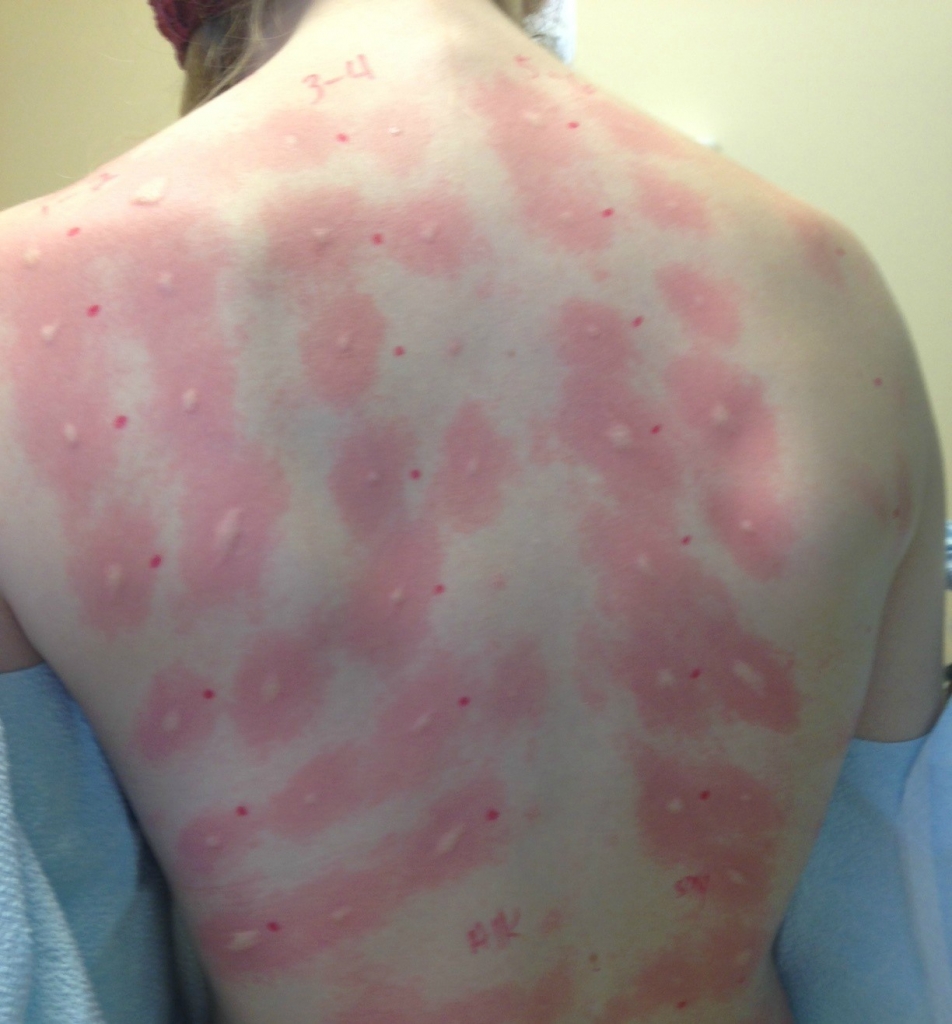Imagine you are traveling for a wedding. You brought your weight in food so you don’t have to eat out. Restaurants are expensive, yes, but more importantly, it’s almost impossible to eat at a restaurant and avoid a reaction if you have food allergies like me. No, you want to look and feel good so you can enjoy the wedding and the party. You successfully appease your family, none of whom share your condition (thank goodness!), and avoid the temptation of restaurants on the way.
You arrive at the wedding, and it’s beautiful. You cry your eyes out, hug the bride and groom, and head over to the reception. The first hour or two is great as you enjoy visiting with family and friends you don’t see often. Then it’s time to eat. Here you choose, indulge in the food and suffer the symptoms to come, or be the only person at the table (probably at the event) not eating. Which do you choose?
After dinner, it’s time to cut the cake. The adorable couple smear cake on each other’s faces and then welcome everyone over to the dessert table. If you suffer from any kind of food allergies, one thing is for sure, your allergy is probably in the dessert at a wedding. And it’s probably the foods that cause the worst reactions. But dessert is sooo good. You pass it up, and if you’re like me, sadly. It’s all a bit like being the only one at the costume party without the costume, or like being the only one at a party or bar not drinking (that’s also me).
Go back to that first choice you made. Did you choose to eat or be the only one not eating? If you chose not to eat, please now imagine what everyone else is thinking while you avoid partaking in this gift of food. What do you suppose they are thinking? Perhaps that you are snooty? A hypochondriac? Rude?
Have you ever found yourself wondering about food allergies and sensitivities? Whether they are real or a figment of said sufferer’s imagination?
Well, let me just assure you that they are real. Allergies are a damaging immune response by the body to a substance to which it has become hypersensitive. These substances can include medicines; environmental stimuli like pollen, mold, latex, and cosmetics; insect stings and venom; and food among others. Scientists can detail what happens in the body during an allergic reaction. People die from allergic reactions. Read more about how serious food allergic reactions can be here.
Food sensitivities are also real. Sometimes they have names and severe consequences like celiac disease. Sometimes the reactions are less severe, but that does not mean the people who have food sensitivities should be expected to live with these reactions on a daily basis in order to avoid simple inconveniences to others.
I am unsure where the current attitude about allergies and sensitivities arose. Here in America at least, people seem to have chosen to have sympathy for certain ailments, but not for others.
Cancer, heart disease, diabetes, Alzheimer’s disease – organizations and people have rallied around diseases like these. They are deadly, serious diseases that cause devastation to the families and individuals who are affected by them. But let me repeat a sentence from above: People die from allergic reactions. Why is it that someone would never expect a diabetic to eat a life-threatening amount of sugar or skip an insulin shot, but they have trouble believing that someone cannot eat something because it contains, or may be cross-contaminated with, something they are allergic to?
I have food allergies and environmental allergies. I’ve had them since childhood. None of them are currently life-threatening. They have evolved and changed throughout my life. The intensity and severity of the reactions have evolved, and the stimuli to which I react have evolved. At one point, they nearly disappeared, but they have since returned with a vengeance.

I recently returned to an allergist for a skin scratch test. This test is not 100% effective, and neither are the other tests such as blood tests. I know of people who have anaphylactic reactions to foods that tested negative on skin scratch or blood tests. The only way to correctly identify foods that you react to is to perform a carefully monitored and controlled elimination diet, which involves removing any food to which you might possibly be reacting for a period of time and then slowly reintroducing one food at a time and recording any changes in how you feel.
In my skin scratch test, I reacted only to pistachios. It was a severe reaction and I was prescribed an EpiPen. I have never reacted to a stimulus with anaphylaxis, but, as I explained earlier, allergies are constantly evolving. I could at any time develop an allergic intensity to a particular stimulus that could kill me if I am not prepared. This includes not just pistachios, but any food that may be contaminated with pistachios. You know that little warning on processed foods that goes something like: This product has been processed in a facility that also processes peanuts, tree nuts, and wheat? Those warnings are for people like me. It also includes things I put on my body, and things in my surroundings. My family cannot set up at an area on the beach where there is a pile of pistachio shells laying on the ground — probably not something most people consider when eating a healthy snack like this.
I am still trying to learn about my body in its current state, but currently, I know that I react to tree nuts, peanuts, corn, and eggs. Usually my reactions include swollen, sunken, itchy eyes; hot, swollen face; swollen abdomen; fatigue; facial and body acne; irritability; brain fog; trouble sleeping, and joint pain. None of these symptoms are currently life-threatening, which seems to mean to some people that it doesn’t matter – that I should just live with those symptoms on a daily basis so as not to cause inconvenience to anyone else. Although, I’m sure my family can agree that some of those symptoms do inconvenience them as well. I just want to reiterate, though: even though I believe people should have enough empathy for me to not expect me to live with these symptoms on a daily basis, more importantly, people need to understand that these non-life-threatening symptoms can evolve any day to become deadly.
I know as I write this that many who read it will finish the post unperturbed. They have access to proof that allergy sufferers can, at any time, die because of contact with an allergen and will choose not to believe it. That is, until the sufferer actually dies. Then it becomes real to them. I guess that is human nature. I’m not sure how severe the situation needs to get in the US for people here to start treating the condition with the amount of passion that they do with diseases like the ones I mentioned above. I’m not sure how many people have to die in order for people to actually take it seriously.
Allergic reactions happen every day. I have a friend whose child is allergic to almost everything. It has gotten so bad, that he may, at 7 years old, have to be put on a specially made formula from which all possibly reactive proteins have been removed. This boy has allergic reactions to stimuli every single day, some of them life-threatening, yet parents, teachers, and administrators of the school he attends continue to treat his condition like it simply doesn’t exist. My friend has attended 504 meetings with officials who try to enforce rules at the school to make it safer for him, sent emails, made calls, and pleaded with staff and parents, and they continue to scoff at her attempts to keep her son safe.
Is it unfair to the parents of the other students in his class to ask them to bring safe treats rather than treats that contain allergens that could kill one of the students? No. If you think having to be selective with foods that you send to the school with your child in order to not kill another student at the school is too inconvenient, then you may need to reevaluate your values. The people who actually suffer from allergies have to keep these foods out of their lives at all times. You’re lucky. Count your blessings.

What’s it like living as an adult with food allergies? It sucks. Sometimes I eat foods that are cross-contaminated because my will-power is all used up for the day. You know how processed foods are addictive? Yeah, I experience that too, even if I suffer more than a non-allergic person who eats those foods would (everyone suffers from eating processed foods). Sometimes I eat at restaurants because, dammit, the food is good and I hate cooking. Sometimes I eat food of which I don’t know the exact ingredients (everything has corn… everything) because I’m hungry or because I’m in situations like the wedding scenario I described in the beginning of this post, and I don’t feel like being that person. And then I suffer.
Luckily, and here’s where I count my blessings, I haven’t had a life-threatening reaction when doing this. Yet.
Food allergies and sensitivities make life difficult. Every single time you put something in your mouth or on your skin, you have to be aware and mindful. Every single time you shop for groceries or get a massage or buy cosmetics, you have to read the labels. You have to pass up countless taste and social opportunities. Sure, it becomes a part of life and it’s manageable, but it’s never easy. Why the hell would someone make this up? Nobody wants to live like this, so please, instead of passing judgment or even risking someone’s life with allergens, consider empathy. We aren’t trying to make your life more difficult, we’re just trying to survive and live well.
What are your experiences with allergies?
